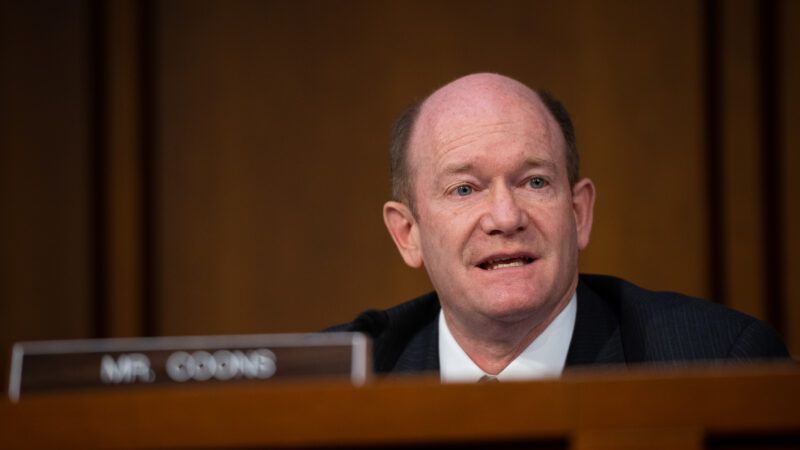Sending U.S. Troops to Ukraine Would Be a Massive Mistake
But politicians like Sen. Chris Coons are still flirting with the idea of direct American military intervention.

The White House has made it clear that American soldiers won't be joining the fight in Ukraine, and rightfully so. Having just withdrawn U.S. troops from a protracted war, President Joe Biden seems unwilling to assume the risks of entering another far-off conflict in the name of the American interest.
But that hasn't stopped Sen. Chris Coons (D–Del.) from making interventionist overtures. On Face the Nation this weekend, host Margaret Brennan questioned Coons on his recent statement that Congress and the Biden administration must "come to a common position about when we are willing to go the next step and to send not just arms but troops to the aid in defense of Ukraine."
"You said if the answer is never, then we are inviting another level of escalation and brutality by Putin," said Brennan. "Are you arguing that President Biden…was wrong when he said he would not send troops to Ukraine? Are you asking him to set a red line?"
Worrying that we might "see Ukraine turn into Syria," Coons did not reject the idea that U.S. troops should remain uninvolved in the conflict in Ukraine. "The American people cannot turn away from this tragedy in Ukraine," the senator asserted. "I think the history of the 21st century turns on how fiercely we defend freedom in Ukraine and that Putin will only stop when we stop him."
Coons later backtracked on Twitter, saying he's "not calling for U.S. troops to go into the war in Ukraine." But his initial comments—which very clearly turn on the possibility of sending U.S. troops to Ukraine—highlight a worrying trend of politicians refusing to recognize the costs of direct U.S. military intervention in the conflict there. In addition to the question of putting American boots on the ground, some members of Congress are pushing for forms of entanglement that could be truly devastating.
Several politicians have become enamored with the idea of a NATO-enforced no-fly zone over Ukraine. Sens. Joe Manchin (D–W.Va.) and Roger Wicker (R–Miss.), as well as Rep. Adam Kinzinger (R–Ill.), have all publicly advocated for a no-fly zone. Proponents of the measure fail to mention that a no-fly zone must be enforced somehow, or at least decline to engage in a realistic discussion about how disastrous a direct shooting war with Russia would be. Downing Russian planes would only serve to escalate tensions and entangle more military powers in the conflict in Ukraine.
When polled by Quinnipiac last month, Americans overwhelmingly favored a cautious approach to U.S. assistance for Ukraine. Three-quarters said the "U.S. should do whatever it can to help Ukraine, without risking a direct war between the U.S. and Russia." A YouGov/CBS News poll in late February showed 71 percent of Americans oppose a troop deployment to Ukraine, and more recent polls have garnered similar results. Though economic measures like sanctions are popular as ways to counter Russia, military action is not.
"Senator Coons is a close friend of the president's and the administration, and we just respectfully disagree with his proposal," said Jen Psaki, the White House press secretary, in a briefing yesterday. "The president has no plans to send troops to fight a war with Russia. He doesn't think that's in our national security interests."
It isn't, and it's deeply concerning that many politicians continue to downplay the unavoidable risks of military engagement. Interventionist members of Congress won't be the ones to bear the potentially catastrophic brunt of the policies they're pushing. Those costs will be borne by the American people—and they've made clear that they're uninterested in taking them on.


Show Comments (225)